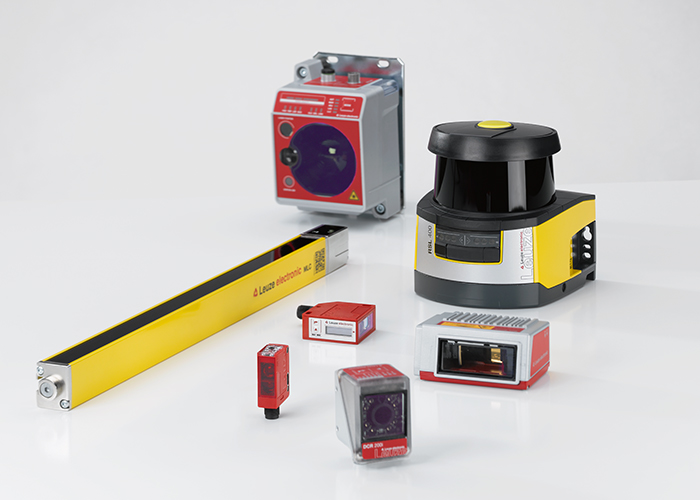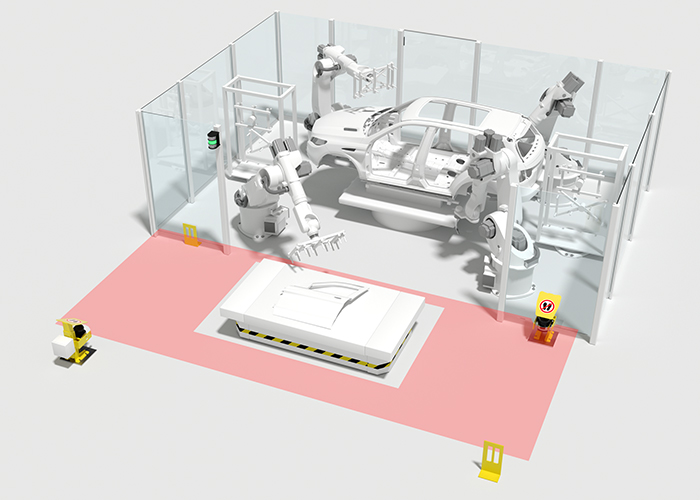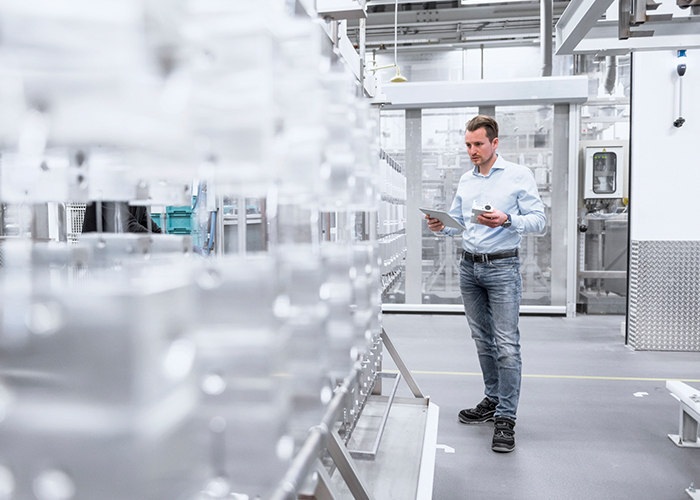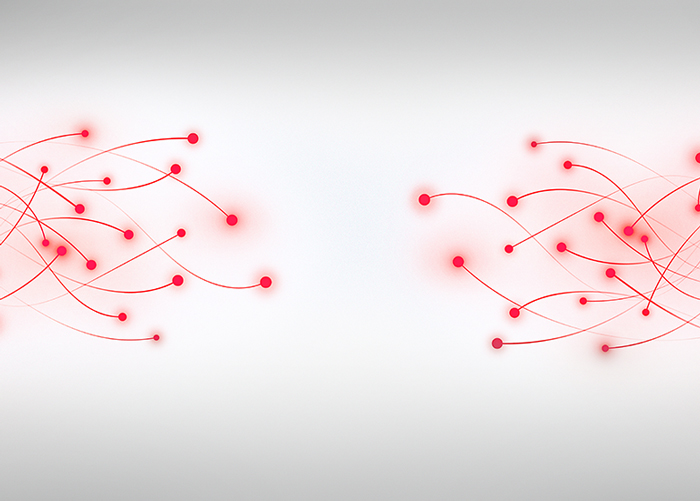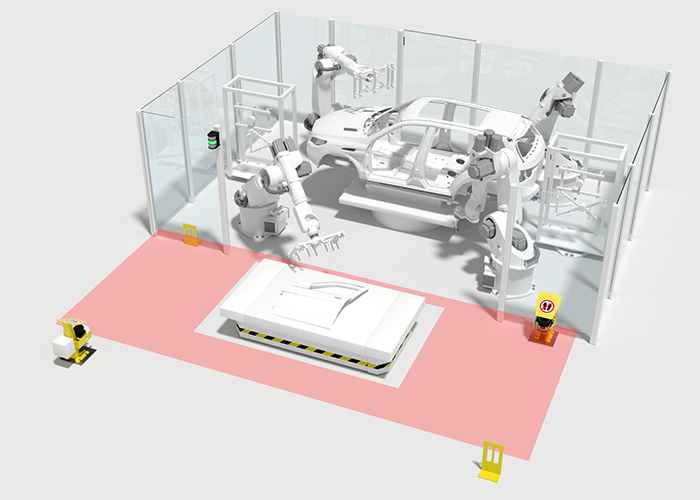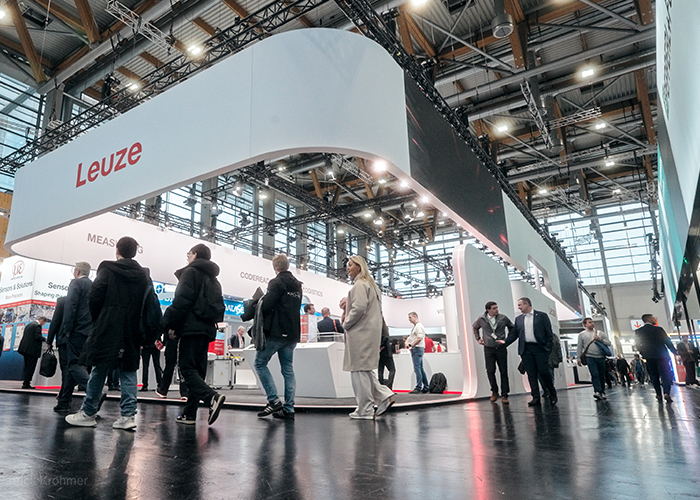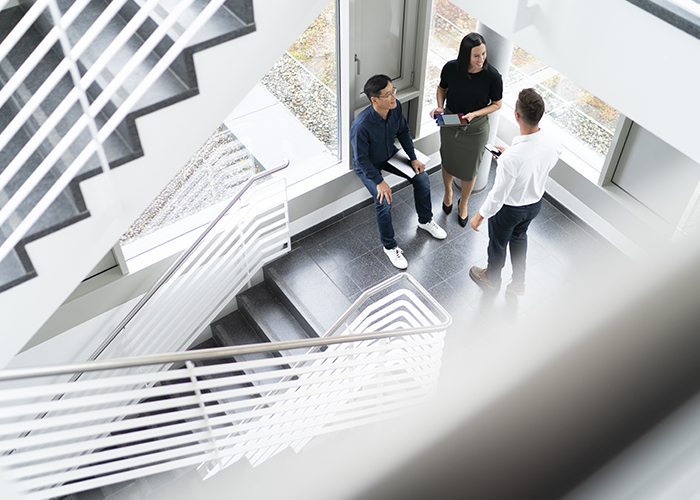Compact scanner
Advantages for you
In purchasing:
- Global availability
- Fast order processing
- Fast delivery
- Optimum price/performance ratio since the BCL 200i has the exact function range needed for this application
During commissioning:
- Simple and fast alignment with autoAdjust
- Simple parameterization
- Avoid connection errors with M12 connection
During servicing:
- Global availability of devices
- Reliable device exchange with PROFINET: configuration and parameter memory via the control or neighborhood detection
- Simple and fast device exchange through M12 connection

Applications

Detection of 1D-codes with picket-fence or ladder arrangement with guided container reading
Requirement:
A conveyor line with two parallel conveyors should be designed as compactly as possible. Various containers with 1D codes are to run in picket-fence or ladder arrangement and be reliably detected. The sensor should have the exact function range necessary for solving the application. Extended functions are not desired by the customer due to budgetary reasons.
Solution:
Through its compact design, its lateral cable outlet and dovetail, the BCL 200i bar code reader can also be mounted in constrained spaces between the conveyor lines. It reliably detects the 1D-codes, independent of whether they are printed on the label with picket-fence or ladder arrangement. With performance tailored to this application, the BCL 200i offers an efficient price/performance ratio.

Detection of 1D-codes in picket-fence arrangement with guided tray identification
Requirement:
Various trays marked with 1D-codes in a picket-fence arrangement run on a conveyor line. The 1D-codes are to be reliably detected with a bar code reader. The device must be equipped with integrated interfaces and worldwide sensor diagnosis should be possible.
Solution:
The BCL 200i bar code reader reliably detects 1D-codes in a picket-fence arrangement. The device features integrated Ethernet TCP/IP, Ethernet/IP and PROFINET interfaces. The web-based configuration tool enables remote diagnostics from anywhere in the world.
Diversion: Detecting damaged bar codes using code reconstruction technology
The BCL 200i features a so-called code reconstruction technology. This means that even damaged or soiled bar codes or bar codes with a small bar height can be read without problem. This results in significantly higher system availability with fewer no-reads.

Highlights
Optimized for guided container and tray identification
With performance tailored to this application, the BCL 200i offers an optimum price/performance ratio.

Compact design for constrained spaces between the conveyor lines
Through the compact design as well as its lateral cable outlet and dovetail, the BCL 200i bar code reader can also be mounted in constrained spaces between the conveyor lines. As a result, it is possible to save space already during the design of the conveyor line.

Activation of the bar code reader without additional sensor systems
With autoReflAct (automatic Reflector Activation), the bar code reader is activated without additional sensor systems. This is achieved by directing the scanner with reduced scanning beam towards a reflector mounted behind the conveyor path. As long as the scanner is targeted at the reflector, the reading gate remains closed. If, however, the reflector is blocked by an object such as a container with a bar code label, the scanner activates the read procedure, and the label on the container is read. When the path from the scanner to the reflector has cleared, the read procedure has completed and the scanning beam is reduced and again directed onto the reflector.

Bar code reading even with a large angle of rotation
The proven code reconstruction technology (CRT) enables bar code readers of the BCL 200i series to read bar codes with a small bar height, as well as bar codes with a damaged or soiled print image. With the aid of the CRT decoder, bar codes can also be read without problem in other demanding situations, such as with a large tilt angle (twist angle).

Technical properties
| BCL 200i | |
| Bar codes: All common 1D bar codes (Code 128, 2/5 Interleaved, EAN 128, Code 39) | |
| Light source: Red light laser (laser class 1 acc. to IEC/EN 60825-1:2014) | |
| Reading field: M optics from 40 mm – 255 mm (m=0.5 mm) | |
| Modulus size: m=0,2mm … 0,5mm | |
| Scanning rate: 1000 scans/s | |
| Beam exit: On front or lateral with deflecting mirror | |
| Scanner: Line and raster scanner | |
| Integrated interfaces: Ethernet TCP/IP; Ethernet/IP and PROFINET RT | |
| Digital IOs: 1x fixed switching input / 1x fixed switching output | |
| Ethernet port: 1x single port for star topology | |
| Configuration: Ethernet: via webConfig (identical to BCL 308i) PROFINET: GSDML file (identical to BCL 348i) Ethernet/IP: via webConfig (identical to BCL 358i) | |
| Connection: 1x fixed cable (0.9 m) with M12 connector (PWR/IO), A-coded, 5-pin 1x fixed cable (0.7 m) with M12 socket (Ethernet/PROFINET), D-coded, 4-pin | |
| Operating voltage: +18 … +30 V DC | |
| Housing: diecast aluminum, IP 65 | |
| Optics cover: Glass | |
| Ambient temperature (operation): 0 … +40°C | |
| Dimensions: Compact design (WxHxD): 92x38x84 mm | |
| Certifications: CE, CDRH, UL |
Frequently asked questions about the BCL 200i bar code reader
With webConfig, just a few minutes are needed for commissioning.
Products with webConfig do not need separate software.
The BCL 200i has a 1-port interface; several code readers can be connected to a switch.
With PROFINET, the entire configuration is stored in the control and is mirrored onto the device when exchanging. The PROFINET station name is conveyed via the "neighborhood detection" function.
The BCL 200i/300i series can be combined.
Thanks to the lateral dovetail mounting and cable outlet, the BCL 200i is optimized for constrained spaces.
With the "webConfig" web-based configuration tool, the BCL 200i can be accessed remotely without the use of an additional external program. As a result, simple and remote diagnosis is possible from anywhere in the world.
Short downtimes, since the parameter set is immediately available following a device exchange. Proven configuration via GSDML file in the control, identical to the BCL 348i.
Yes, standard cables can be used: two M12 connectors (PWR/IO and HOST) with fixed connection cable. This results in fast commissioning and cost savings through reuse of the cables.
Through the integrated "Automatic Reflector Activation (AutoReflAct)" function, the bar code reader can also be activated with a reflector. This eliminates the need for additional sensors.
Advantages for you
- High system availability: Integrated code reconstruction technology enables reliable reading of damaged codes and, thus, a smooth process sequence
- Simple integration: Module selection in the GSD/GSDML files allows easy integration into PROFIBUS/PROFINET networks or via IODD into IO-Link connections
- Fast device exchange: The storage of parameters in the integrated memory enables fast exchange
- For various areas of application: Code reading on objects of different heights, in constrained spaces or on objects moving at a high speed
- Available with various operating principles: Laser single line, raster scanner, deflecting mirror or oscillating mirror
- For medium to large operating ranges
- Intelligent fastening concept: We have developed the BT 300 mounting bracket especially for constrained spaces. It enables mounting of the BCL 300i very close to transport systems

Applications

Container reading with bar codes in ladder arrangement
Requirement:
In an intralogistics center, containers with bar code labels run in ladder arrangement. Because the containers extend to the edge of the conveyor line, the bar code must be read from a short distance.
Solution:
The BCL 300i bar code readers in the line scanner model can also reliably read the bar codes from a very short distance (zero distance).

Tray reading with bar codes in picket fence arrangement
Requirement:
Running on a conveyor belt are various cartons all of which are on trays with bar codes in picket fence arrangement. All of the bar codes are to be reliably detected.
Solution:
The BCL 300i bar code readers in the raster scanner model can reliably read all of the bar codes in picket fence arrangement.

Code reading on objects of various height
Requirement:
If objects of various height are transported on a conveyor line, it must be guaranteed that the 1D-codes are read independent of their position.
Solution:
The BCL 300i 1D-code readers are available in models with oscillating mirror that can read moving objects at different heights.

Code reading in constrained spaces
Requirement:
If 1D-code readers are used in applications with small installation depth, a device is needed that can also reliably read bar codes from very short distances.
Solution:
The BCL 300i 1D-bar code readers are also available as raster scanners with deflecting mirror for zero distance reading. This allows them to reliably read the bar codes even with constrained spaces between conveyor lines. Thanks to the integrated code reconstruction technology, the devices can even read damaged codes reliably.
Highlights
- Simple integration thanks to integrated connectivity – in this way the most important interfaces are already integrated in the device.
- Comfortable online parameterization and diagnosis with webConfig software via Ethernet.
- Oscillating mirror models for automatically scanning on large areas with variably placed codes.
- Innovative Multiscan functionality for coupling several BCLs into one unit without additional devices, e.g. for reading from two sides.
- Integrated switch functionality saves the time and expense of cabling in all Ethernet fieldbuses through device line wiring.
- Function extension: Optimized J-optics for improved detection of directly printed codes on packaging. Integrated Ethernet IP interface for quick and easy connection to the control without additional gateway.

Technical properties
| BCL 300i | |
| Reliable reading of all common 1D-codes | |
| Flexible installation options through front or perpendicular beam exit | |
| Reading range: 50 - 680 mm* | |
| Modulus size: 0.127 - 0.8 mm* | |
| High scanning rate of up to 1,000 scans/s for objects with high movement speed | |
| Ambient temperature (operation): 0 – 40 °C (without heating), –35 – 40 °C (with heating) | |
| Interfaces: PROFIBUS, PROFINET IO/RT, Ethernet TCP/IP, UDP, Ethernet IP, EtherCAT, multiNet, RS 232, RS 422, RS 485, IO-Link | |
| Degree of protection: IP 65 | |
| Dimensions (W × H × L): 95 × 44 × 68 mm (single line scanner), 125 × 58 × 110 mm (oscillating mirror), 103 × 44 × 96 mm (deflecting mirror) | |
| Connection by means of modular connection hoods with M12 connector, clamp connection or fixed connection cables | |
| Models available with display and heating |

